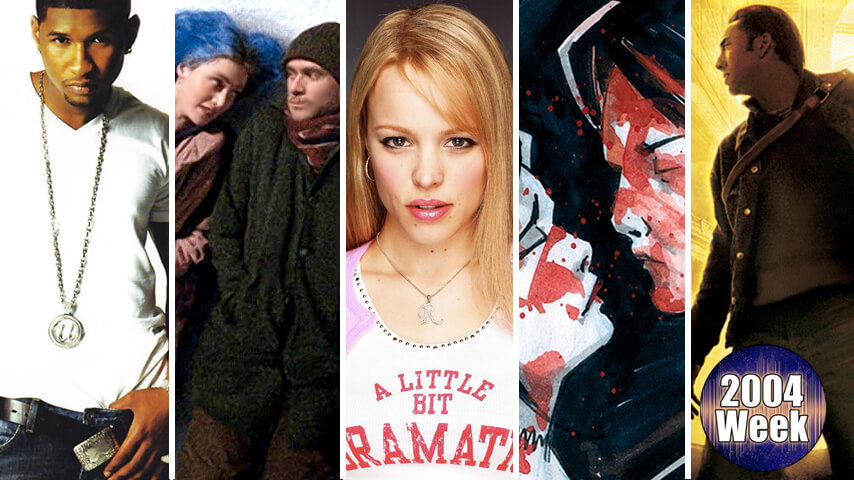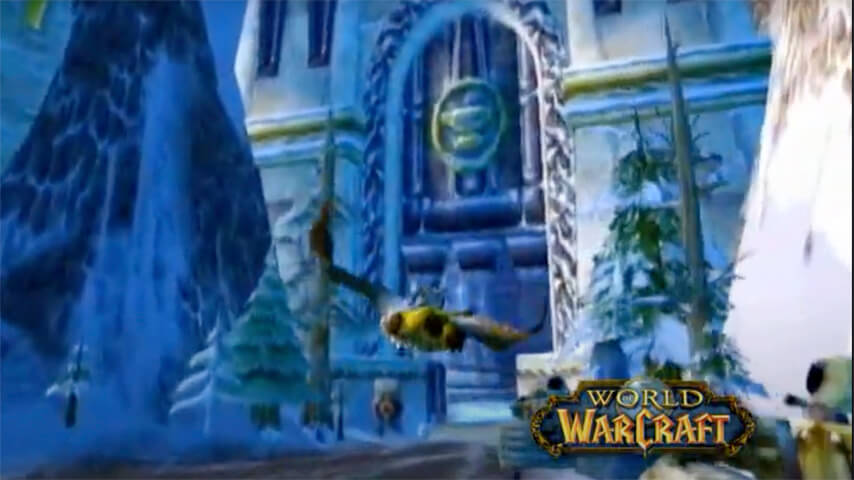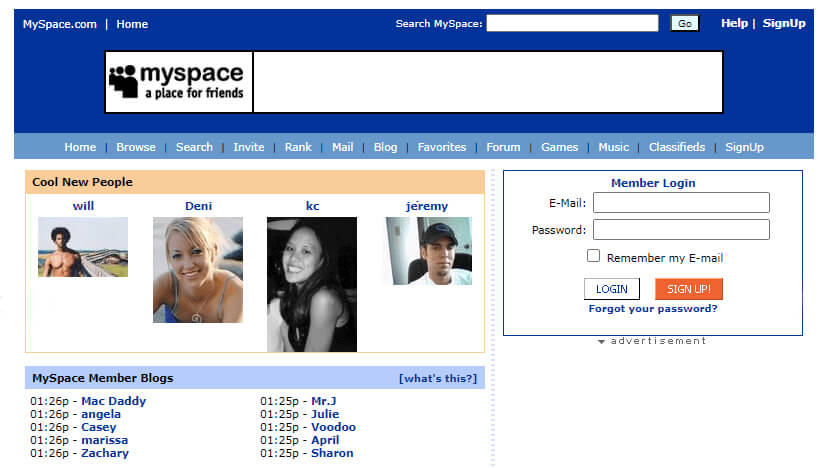AVQ&A: What pop culture screams 2004 to you?
We remember the movies, music, and moments that take us back to 2004
Images courtesy IMDb, Focus Features, Paramount Pictures, Reprise, Disney
The A.V. Club has had a lot of fun looking back at the year 2004 this week, and more broadly, bringing back our annual retrospective package. Now, as is customary, we’re capping off the week with a staff Q&A: What pop culture screams 2004 to you?
“Yeah” by Usher
If we’re talking about a pop cultural artifact that screams 2004, well, nothing is more declarative of that year than “Yeah!” by Usher featuring Ludacris and Lil Jon. With the simple sentiment behind “Yeah!” Usher captured something both of the moment and timeless. It was number one on the Billboard Hot 100 for 12 consecutive weeks and won a Grammy. It was ubiquitous and universal in a way songs rarely get to be anymore, completely transcending as a club hit and becoming maybe the most iconic song about the club, ever. The lyrics are raunchy (particularly the Luda verse), there’s a delicious tension between Usher and his shorty, and Lil Jon did indeed have the beat that made all our booties go. And the expression—well, how else can you express the feelings behind such a sexy dance floor meeting beyond an emphatic “Yeah!” There’s a reason this song reached 13-time platinum status after the trio performed it at the Super Bowl; it’s one of the all-time great bangers, and the perfect musical time capsule to 2004. [Mary Kate Carr]
Mean Girls
2004 was a formative year because it marked multiple films with the Hollywood cool girls: Halle Berry was Catwoman, Jennifer Garner reversed from 30 to 13, Hilary Duff turned into Cinderella, and Mary-Kate and Ashley Olsen did their last film together in New York Minute. But nothing—nothing—captured that part of the zeitgeist more than the ever-quotable Mean Girls. It catapulted Lindsay Lohan, Rachel McAdams, Amanda Seyfried, and Lizzy Caplan into stardom, while Tina Fey and Amy Poehler firmly found a place for their brand of comedy in Hollywood. It might not be a particularly great movie overall, but it goes down in history for ruthlessly depicting how young girls survive in the wild. As someone who was a teen when Mean Girls released, I’ve never felt more represented by the histrionics and humor. Rewatching it still reignites a certain type of nostalgia, so it’s definitely the most defining 2004 pop culture moment for me. [Saloni Gajjar]
Prince and Beyoncé performing “Purple Rain” at the Grammys
In 2024, the musical forbearer of the MTV era most often mentioned alongside Beyoncé is usually Michael Jackson. But in 2004, it was the funk and soul of Prince that brought the then-22-year-old performer to the stage of the Grammys to open the show. Celebrating the 20th anniversary of Prince’s landmark Purple Rain, the two performed a medley of that title track along with “Let’s Go Crazy,” “Baby I’m A Star,” and a little smattering of Beyoncé’s own “Crazy In Love.”
There are certain things about the moment that scream 2004: the fact that Gwen Stefani and Quentin Tarantino gave Bey her first trophy immediately after, the fact that the moment served as the basis for then-cast member Maya Rudolph’s now-infamous SNL impression. But more than that, it’s a position that is rare to see Beyoncé in these days: supporting act to a musician that she no doubt admired. It served too as an important passing of the torch; a lot of those influences—Prince, Jackson, Whitney Houston, Luther Vandross—are no longer with us. She may have left the ceremony with five trophies, but it’s the moment with Prince that truly signaled her arrival as the face and force of a new generation. [Drew Gillis]
The Apprentice
Not a cheerful answer, but one that leapt almost immediately to mind as soon as I started really trying to think about 2004 pop culture: It’s got to be the rise of Mark Burnett and Donald Trump’s The Apprentice. A slickly produced presentation of deeply damaged personalities—none moreso than the scowling, petty tyrant at its center, who the show bent over backwards to present as an aspirational figure—The Apprentice was the slimy chrysalis from which so much truly terrible reality television would crawl. (To say nothing about its other, more improbably wide impacts on American politics and culture.) Less overtly scuzzy than the previous year’s Joe Millionaire, The Apprentice nevertheless sold itself on an ugly idea, i.e. that anyone sufficiently famous and wealthy must, by default, be worth emulating. The whole thing was suffused with a little bit of irony—someone clearly thought they were being clever by picking The O’Jay’s “For The Love Of Money” as the show’s title song—but if there’s one lesson to be taken from the pop culture of the mid-2000s, it’s that there’s no such thing as ironically giving bad people dozens of hours of TV attention and idolatry. [William Hughes]
National Treasure
You probably haven’t read many National Treasure re-appraisals over the past two decades because baby? It never left. (Well, in my house at least.) But while the movie that boldly introduced stealing the Declaration of Independence to the lexicon may not be one of the best films of 2004—or even the year’s most interesting entry about a contentious family treasure hunt—it is one of the most 2004. Nicolas Cage’s face was everywhere—at McDonald’s, the NASCAR track, you name it. Despite nearly being laughed out of town upon its release, National Treasure still became a favored well of one-liners for middle-school classrooms everywhere—largely thanks to Justin Bartha’s excellent Riley—capable of going up against, well, if not Mean Girls, then at least Napoleon Dynamite. Like Green Day’s American Idiot, the Jon Turteltaub film is also an artifact of a very specific moment of post-9/11 patriotism (albeit an entirely different side of the coin than the band explores), and provides a nice reprieve within a genre that might look a little more QAnon-y if it was made today. It also has evil Sean Bean in it, so really, what’s not to love? God bless National Treasure. [Emma Keates]
My Chemical Romance’s Three Cheers For Sweet Revenge
It’s wild to me that so many albums that profoundly impacted me were released in 2004. I remember having my mind blown by The Killers’ Hot Fuss, being energized by Green Day’s American Idiot, and feeling completely, dumbfoundedly seen by My Chemical Romance’s Three Cheers For Sweet Revenge. But in my memory, all of these things happened at wildly different times; there’s no way all three of those albums, all so different and yet monumental at the same time, came out within a year of each other. In my mind, I was a completely different person during each of those moments. They all had to be years apart. But I guess that’s just what it feels like to be 13, trying to find yourself and understand how all the things you like can make sense together because they’re all part of you, even if they’re not remotely similar.
Still, it has to be Three Cheers For Sweet Revenge that most encapsulates 2004 for me. Hot Fuss was fun and weird and different, and American Idiot was a better representation of where the collective culture was at in 2004, but I was 13 years old. Eighth grade, last year of middle school, realizing I felt alienated from all my friends because we were slowly growing apart. So obviously a song like “I’m Not Okay (I Promise)” was gonna hit me exactly where it hurt—but, like, in a good way. And a cliché “everything hurts and no one understands” way. And maybe this is just nostalgia talking, but I still think Three Cheers For Sweet Revenge—and My Chemical Romance as a whole—absolutely rules. From the costumes to the music videos to the theatrical, impassioned vocals, you can tell MCR meant it, a hell of a lot more than many of their peers who have since faded into obscurity or wildly changed their style. In a time when it was deeply, tragically uncool to actually care about anything, My Chemical Romance cared a lot, and they weren’t afraid to show it. [Jen Lennon]
Eternal Sunshine Of The Spotless Mind
There are plenty of things to love about Eternal Sunshine, which just nabbed the number-one spot in The A.V. Club’s rundown of the best films of 2004: the narrative braininess of Charlie Kaufman’s script, the nifty visual effects that are almost synonymous with music-video whiz Michel Gondry, the surprising shy-guy turn from Jim Carrey, and the fact that it’d be hard to counter someone if they claimed this was the greatest romantic comedy of the aughts. But there is also plenty that, per this week’s prompt, screams that particular year and basically snaps you back to it, including that awesome song by The Willowz (and, in retrospect, kind of annoying one by The Polyphonic Spree), Joel’s (Carrey) collared-shirt-and-sweater combo, Clementine’s (Kate Winslet) quirky apartment decor, Stan’s (Mark Ruffalo) whole Brooklyn-hipster vibe, and that pitch-perfect, heart-tugging score by Jon Brion, who was on quite the run back then. [Tim Lowery]
World Of Warcraft

Screenshot from 2004 E3 trailer
An energy drink with a ridiculous name hated to see me coming in 2004. Pounding Rockstar or Red Bull or, god forbid, Bawls in the gaming cafe was how I spent far too much of my school years, and 2004 was the year that I got to install World Of Warcraft on the home computer. This installation graduated me—disc by disc—from RuneScape and Kingdom Of Loathing to the MMORPGs of the real gamers. And it blew my mind. I knew games could be addictive, and form community, but I had no idea the extent to which a game that excelled at both could take over your life. When I made my first character, a human rogue, and joined the same guild as all my friends, it forged the same tight bond that I imagine other people felt when they joined their first sports team. We may have shifted from TeamSpeak and Ventrilo to Discord, but my WoW party is still intact, just as linked as we were when we plowed through Deadmines for the first time. World Of Warcraft had intense staying power, even getting its own South Park parody alongside its multiple expansions if you want to stick with “things that date you to the mid-’00s.” But there was nothing like logging on for the first time, on a device that had previously been a family appliance, and finding a world seemingly built just for me to share with my nerdy friends. [Jacob Oller]
“You Wouldn’t Steal A Car” DVD Piracy PSA
The “You Wouldn’t Steal A Car” PSA anchored movies to the year 2004 for nearly a decade. Produced as a joint initiative between the Intellectual Property Office of Singapore and the MPAA to stop teen punks from downloading Cold Mountain, the ad shows different scenarios of unfettered lawlessness on par with downloading The Cat In The Hat (as if that isn’t its own punishment). Told with the jittery editing, grainy photography, and techno muzak that graced seemingly every action movie trailer of the era, “You Wouldn’t Steal A Car” crystalized and probably killed early-2000s action movie aesthetics, still dining out on Matrix’s techno beats and progress bars. The ad spent about a decade appearing on what feels like every DVD produced between 2004 and 2012, reminding everyone what was legal and what 2004 was really like. Now a meme, “You Wouldn’t Steal A Car,” is an indelible part of culture that could only come from one year. [Matt Schimkowitz]
MySpace

Screenshot courtesy Web Design Museum archive
The term “social media” was already floating around in the early 2000s (there are conflicting claims as to its original use, going all the way back to the mid-’90s), but 2004 was the year it started to take the shape we now recognize. Internet service providers were dismantling their walled gardens, everyone was blogging, LiveJournal was going strong, and virtual communities were flourishing on message boards—the stage was set for a platform to combine all of these elements into a network of personalized pages that encouraged online communication and interactivity between users. All of my friends started creating MySpace pages in 2004, and I quickly got sucked in by the ease of use and highly customizable features. Other sites had allowed you to create personal home pages before (hello GeoCities!) but it was the concept of the interactive wall where you could show off your online personality with photos, music and graphics (oh those sparkly, glittery graphics) and get actual feedback from friends and strangers—and give feedback in return—that made it so addictive. Little did we know (well, apart from the experts) that this silly online diversion was the foundation of an entirely new form of mass communication that would eventually wield tremendous power in the real world. [Cindy White]